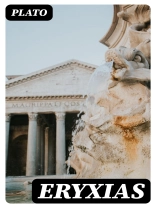In Plato’s dialogue ‘Eryxias, ‘ the philosophical exploration of wealth and virtue is meticulously examined through a conversation between Socratic figures. The dialogue is characterized by its dialectical style, which delves into the relationships between material wealth, ethical integrity, and the nature of the soul. Set within the context of 4th century BCE Athens, a time marked by the tensions between burgeoning wealth and traditional moral values, ‘Eryxias’ serves as both a reflection on contemporary social issues and a critique of the Athenian preoccupation with monetary success. The subtlety of Plato’s prose allows for a layered interaction between the characters, inviting readers to ponder the deeper implications of wealth on personal integrity and societal harmony. Plato, a student of Socrates and the founder of the Academy in Athens, was profoundly influenced by the socio-political dynamics of his time. His philosophical inquiries often emerged from the disillusionment with Athenian democracy and the moral decay he perceived in society. ‘Eryxias’ reflects his belief that true wealth is found in the cultivation of virtue and knowledge, serving as a response to the materialism of his contemporaries. This thought-provoking dialogue is highly recommended for readers seeking to engage with foundational philosophical questions regarding ethics and prosperity. Both scholars and casual readers will find value in Plato’s insights, challenging them to examine their own beliefs about wealth and its role in a fulfilling life.
About the author
Plato, the illustrious ancient Greek philosopher, was a towering figure in the development of Western philosophical tradition. Born circa 427 BCE in Athens, Plato was a student of Socrates and later the teacher of Aristotle, forming a foundational triumvirate in classical philosophy. His contributions extend across metaphysics, epistemology, ethics, and political theory, and his works are expressed in dialogical form, often featuring Socrates as a central character. The authorship of ‘Eryxias’ is debated among scholars; while once considered among Plato’s dialogues, modern scholarship casts doubt on its authenticity, with some attributing it to a follower of Plato instead. Nonetheless, ‘Eryxias’ explores themes of wealth and virtue, motifs recurrent in true Platonic works. Plato’s literary style is marked by the pursuit of truth through dialectic methods and the exploration of ideals such as the forms, principles which inhere transcendentally over empirical instances. Notable among his works are ‘The Republic’, which outlines his vision of a just society and the philosopher-king, and ‘Timaeus’, which delves into natural philosophy and cosmology. Plato’s Academy, the institution he founded circa 387 BCE, was an intellectual crucible for several generations. His dialogues have endured as central texts in the Western philosophical canon, influencing countless thinkers and shaping the course of intellectual history.












